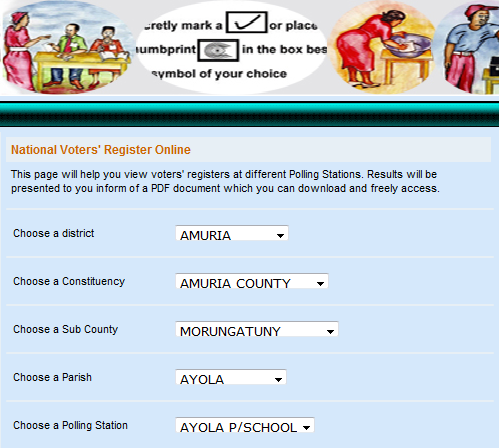Data Envy

The Uganda Election Commission recently launched their National Voters' Register Online system - with the assistance of our friends over at IFES - that allows citizens to confirm that their name appears on the voters roll in their polling place . This is a great step and important service - and something we don't see often enough in many countries around the world. IFES and the other international organizations should continue to focus on these kind of technology initiatives around election administration - and then take the next step by helping civil society groups and political parties use the data to hold electoral officials and governments accountable for good elections.
The data available through the Uganda tool allows citizens to look themselves up if they know where they are registered to vote, and voter lists are provided for each of thousands of polling centers. There are limits to what can be done with data in this format - but the system knows who is registered to vote where, and thus where polling stations are and how they map to all the political districts in the country. The election officials may also have geocode information for polling centers and map data.
This is important data that is often hard to get - and is needed by civil society groups and political parties to conduct many methods of election monitoring such as voter registration audits and other forms of domestic election monitoriing. The data is often available and technically public, but negotiating and acquiring electronic copies of this data is often challenging due to political and as often technical barriers. A lot of resources are spent by NDI civic partners trying to beg, borrow or -- ok, we don't steal data - but suffice it to say it can take a lot of effort to get soft copies of election data for election monitoring - and often happens late enough in the process to make building tools with the data challenging. If mapping applications are desired, pulling together map layers and contextual data sets often compounds the challenge. (Note: If you ever get a chance to talk to Eric Gunderson and his team over at DevSeed, ask them about gathering the fantastic data sets used in our AfghanistanElectionData site - quite a story).
So what jumped out at me as I came across the Uganda tool were a few thoughts about the important role IFES and others can play not only to assist the electoral commissions deliver better elections for their citizens using innovative technologies and approaches as they did in Uganda, but also to help civic groups and political parties better hold the governments accountable to good elections.
A tangible next step could be for our international partners to encourage (or preferably, require) government institutions and election commissions to make the data sets available to civil society so that they can use it to support election monitoring and related activities - and negotiate situations where the data is easily made available to civil society well in advance of elections.
Over time, it could even be possible to institutionalize these approaches into their process so that data sharing between election officials and civil society becomes part of the contractual agreement between these international organizations and their election partners. That would be a major contribution to election oversight efforts around the world.
So why doesn't NDI do this already?
The short answer is we try, and often do have relationships with electoral officials that makes this happen. But NDI doesn't typically provide technical assistance to election officials on the administration of elections.
The background on the division of labor as it relates to international assistance around elections in developing democracies is as follows: NDI, IRI and similar groups typically work with civil society, political parties and citizens around elections in our election monitoring programs - outside government. Groups like IFES and other international organizations often work with government or independent electoral commissions in election administration, often including technical assistance with their databases and information systems.
There are great potential synergies here that we should formalize a bit that involve coordination from international development organizations to leverage principles such as open data and support common overall goals: such as good elections that earn the trust of the citizens.
